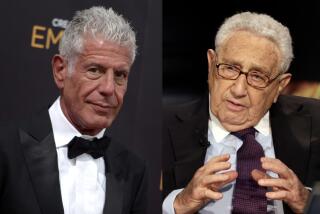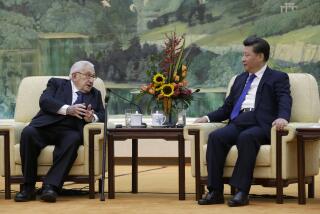Review: ‘Kissinger’s Shadow’ explores diplomat’s long reach in U.S. foreign policy
The picture of Henry Kissinger that emerges in Greg Grandin’s new book — of youthful brilliance curdled by an overweening ego and the will-to-power — is not an attractive one.
The book’s moral sensibilities broadly track those of some other eminent thinkers — including Seymour Hersh, Christopher Hitchens, Walter Isaacson and, most recently, Gary Bass — who have written about Kissinger’s life and handiwork. Despite officially authorized attempts at a counternarrative (including a 2009 book by Alistair Horne and a forthcoming biography by Niall Ferguson), the evidence against Kissinger is simply overwhelming. Grandin’s book will not ease this burden.
In “Kissinger’s Shadow,” Grandin — a Pulitzer finalist, author of “The Empire of Necessity” and “Fordlandia” and professor of history at New York University — plumbs Kissinger’s writing, especially his undergraduate and graduate work at Harvard, for insights into his philosophy of history, theory of statecraft and sense of the role of morality in politics. He then analyzes Kissinger’s later decisions in the political and policymaking spheres through this lens.
Kissinger’s early academic publications, steeped in a now-dated existentialist lexicon, read as dour and portentous today. Nevertheless, Grandin believes they provide important clues about Kissinger’s intellectual evolution.
SIGN UP for the free Essential Arts & Culture newsletter >>
In this early work, Kissinger privileged the idea of self-actualization, the idea that the greatness of a man is related to his ability to bend reality to his own desires. Applied to statecraft, this predisposes public officials toward action — even if, as was made painfully clear in the war in Southeast Asia, that action is undertaken only to convey resolve, or even the very ability to act, discounting the human consequences.
Take the secret, illegal 1970 bombing of Cambodia — rightfully identified by Grandin as “an actual act of moral insanity” — that Kissinger personally oversaw, scrupulously poring over maps and identifying targets for bombers. For Kissinger, conveying America’s ferocity and toughness, signaling the country’s willingness to use the awesome power at its disposal, was an important objective in itself. Whatever the actual strategic or reputational value there was to the bombing, the human costs were unconscionable. From 1969 to ‘73, the Cambodia campaign killed an estimated 100,000 civilians.
This kind of thinking influenced Kissinger even before he officially entered public life. Consider his formative role in helping then-Republican presidential nominee Richard Nixon undermine the 1968 Paris peace talks. Kissinger fed the Nixon campaign secret information about the impending deal between the Lyndon B. Johnson administration and the North and South Vietnamese governments. Nixon told the South Vietnamese that he would get them a better deal, leading them to back out of the talks. Within a few months, after Nixon’s election, Kissinger was rewarded with the position of national security advisor in the incoming administration. (Nixon and Kissinger’s actions, in addition to prolonging the war for seven years, directly contravened the laws of the United States, since private citizens are forbidden from conducting their own diplomacy.)
It is this heroic sense of his own willpower and place in history, Grandin argues, that defines Kissinger, more than his association with any particular strategic position (détente, say) or doctrine (realism, for example). Kissinger began as a Rockefeller Republican, transformed himself into a Nixon man and then — a skilled navigator of politics’ rocky shoals — survived Nixon’s implosion and made himself indispensable to President Gerald R. Ford.
For Grandin, this flexibility was as much about policy as personality. An example of this is Kissinger’s response to 9/11. Known as the consummate realist, he nevertheless threw his lot in with neoconservatives during the George W. Bush administration, supporting the invasion of Iraq to spread democracy abroad.
Indeed, the book’s second major argument is that Kissinger is one of the unacknowledged intellectual forebears of the modern new right, including its neoconservative varieties. At first glance this seems unlikely. After all, Kissinger has taken an avowedly amoral approach to international affairs.
For him, it is the tragedy of human experience, coupled with the belief that interests, not objective truths or values, drive politics; for moralists such as Ronald Reagan (whom he was initially quite suspicious of) and George W. Bush, values are what (at least rhetorically) define American foreign policy — and these values, such as democracy, should be exported, even if at gunpoint. However, Grandin writes, beneath this surface dissimilarity is a common set of premises about the importance of “hunches, conjecture, will, and intuition”; a dislike of official expertise and the caution it can engender; and a very flexible understanding of national self-defense.
Still, it seems to me a stretch to argue, as Grandin does, that Kissinger’s praise for President John F. Kennedy’s handling of the Cuban missile crisis — he thought Kennedy acted admirably in “conjecturing” about Soviet intentions instead of relying on facts — somehow prefigured Vice President Dick Cheney’s post-9/11 argument about treating a 1% likelihood of a terrorist attack as tantamount to being imminent.
I think Kissinger was more tethered to the classical understanding of realpolitik than Grandin acknowledges. One can find a whole variety of intellectual justifications for war-making with the old and new right alike. But especially when it came to major powers, Kissinger could also find justifications for peacemaking, and he did: in helping establish diplomatic relations with Communist China, in his shuttle diplomacy in the Middle East, in negotiating two major arms-control agreements with the Soviet Union, and in spearheading the larger policy of détente.
It was marginal countries across the globe, not the great powers, that suffered most under Kissinger’s watch. In hindsight, the bloodletting he countenanced — in Chile, East Timor (then part of Indonesia), Bangladesh (then East Pakistan), Vietnam, Cambodia and Laos, to name but a few places — was gratuitous.
All these years later, the enduring mystery about Kissinger — only deepened by Grandin’s book — is how so much erudition and so little wisdom could be united in one man.
::
Kissinger’s Shadow: The Long Reach of America’s Most Controversial Statesman
Greg Grandin
Metropolitan: 288 pp., $28
Dorfman is the senior editor of Ethics & International Affairs, the journal of the Carnegie Council.
More to Read
Sign up for our Book Club newsletter
Get the latest news, events and more from the Los Angeles Times Book Club, and help us get L.A. reading and talking.
You may occasionally receive promotional content from the Los Angeles Times.








